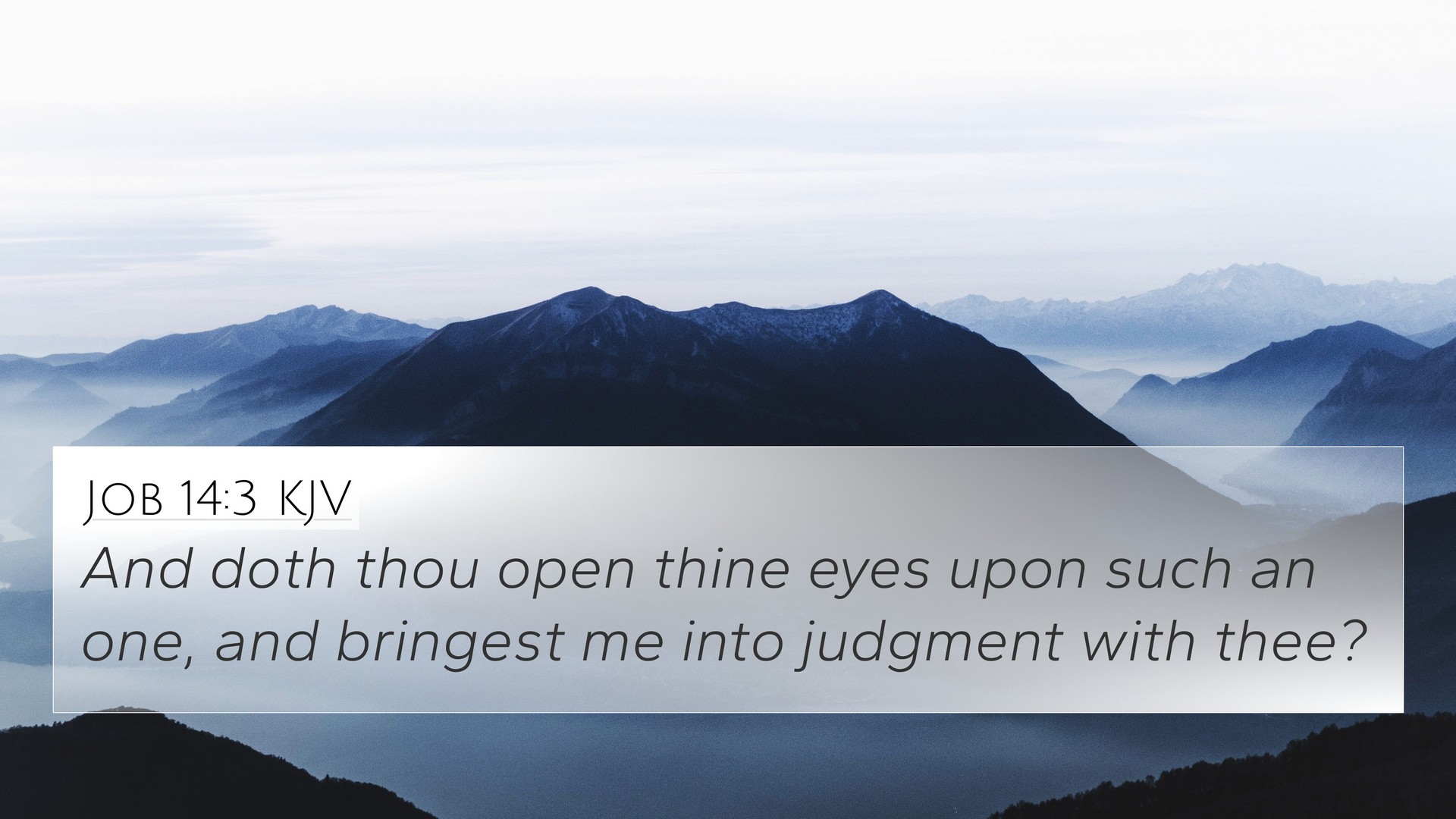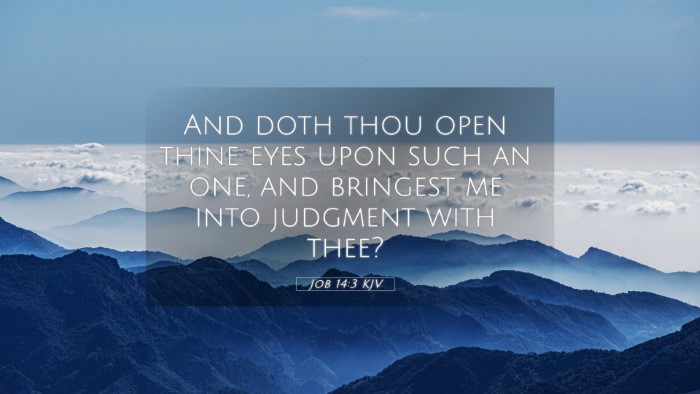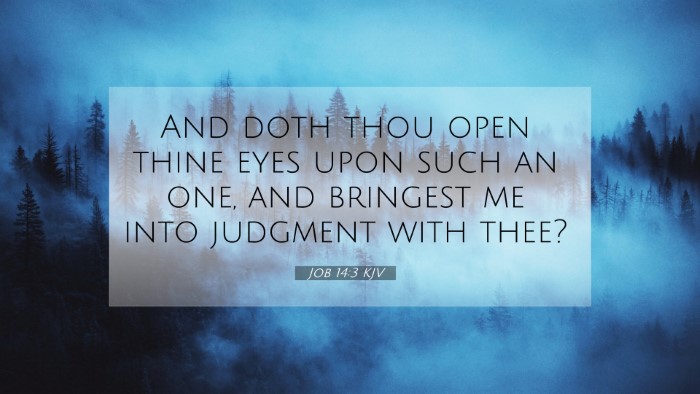Old Testament
Genesis Exodus Leviticus Numbers Deuteronomy Joshua Judges Ruth 1 Samuel 2 Samuel 1 Kings 2 Kings 1 Chronicles 2 Chronicles Ezra Nehemiah Esther Job Psalms Proverbs Ecclesiastes Song of Solomon Isaiah Jeremiah Lamentations Ezekiel Daniel Hosea Joel Amos Obadiah Jonah Micah Nahum Habakkuk Zephaniah Haggai Zechariah MalachiJob 14:3 Similar Verses
Job 14:3 Cross References
And doth thou open thine eyes upon such an one, and bringest me into judgment with thee?
Uncover the Rich Themes and Topics of This Bible Verse
Listed below are the Bible themes associated with Job 14:3. We invite you to explore each theme to gain deeper insights into the Scriptures.
Job 14:3 Cross Reference Verses
This section features a detailed cross-reference designed to enrich your understanding of the Scriptures. Below, you will find carefully selected verses that echo the themes and teachings related to Job 14:3 KJV. Click on any image to explore detailed analyses of related Bible verses and uncover deeper theological insights.
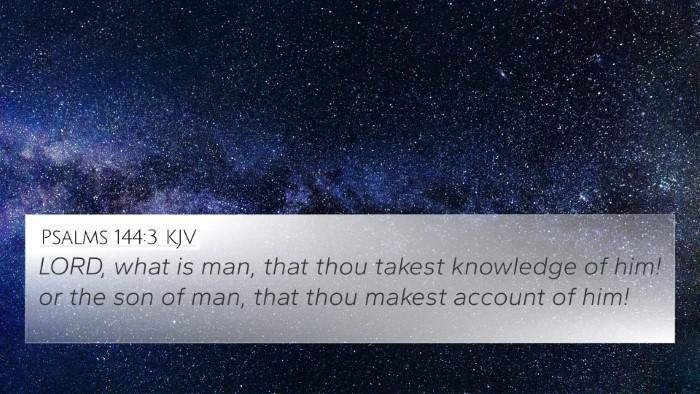
Psalms 144:3 (KJV) »
LORD, what is man, that thou takest knowledge of him! or the son of man, that thou makest account of him!
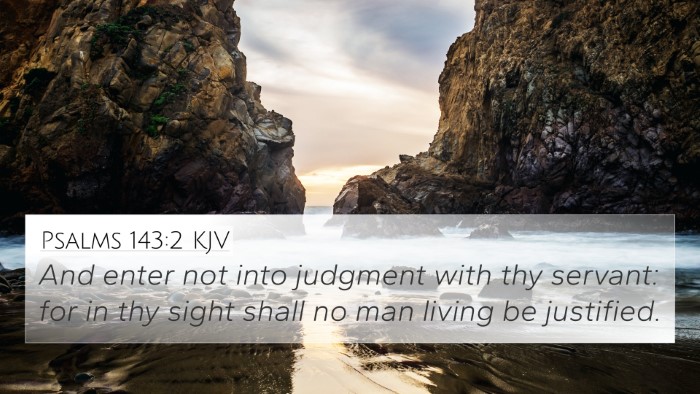
Psalms 143:2 (KJV) »
And enter not into judgment with thy servant: for in thy sight shall no man living be justified.
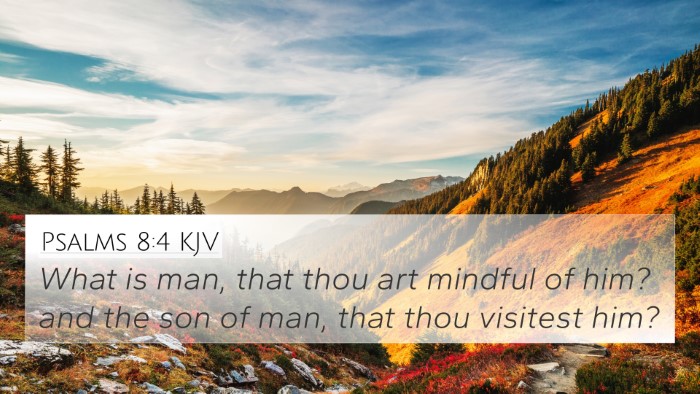
Psalms 8:4 (KJV) »
What is man, that thou art mindful of him? and the son of man, that thou visitest him?

Job 9:32 (KJV) »
For he is not a man, as I am, that I should answer him, and we should come together in judgment.

Job 7:17 (KJV) »
What is man, that thou shouldest magnify him? and that thou shouldest set thine heart upon him?

Job 9:19 (KJV) »
If I speak of strength, lo, he is strong: and if of judgment, who shall set me a time to plead?
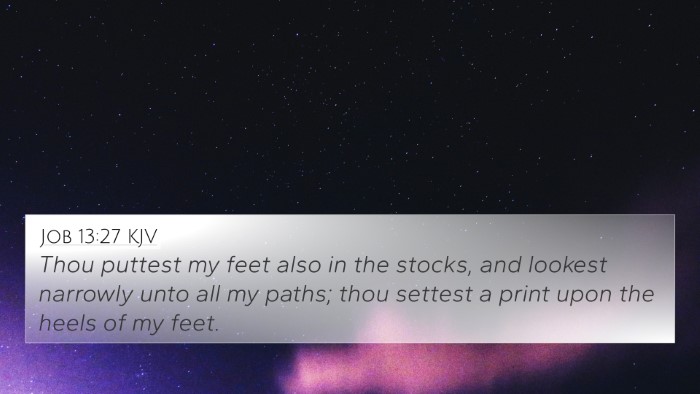
Job 13:27 (KJV) »
Thou puttest my feet also in the stocks, and lookest narrowly unto all my paths; thou settest a print upon the heels of my feet.
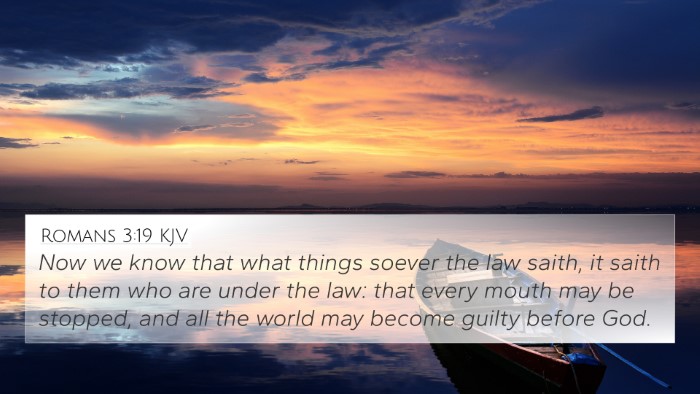
Romans 3:19 (KJV) »
Now we know that what things soever the law saith, it saith to them who are under the law: that every mouth may be stopped, and all the world may become guilty before God.
Job 14:3 Verse Analysis and Similar Verses
Understanding Job 14:3
Job 14:3 states, “And dost thou open thine eyes upon such an one, and bringest me into judgment with thee?” This verse comes from the heart of Job’s lament during his suffering, expressing profound questions about existence, justice, and the nature of God’s scrutiny.
Context of Job 14:3
The Book of Job addresses the themes of suffering, divine justice, and the nature of God. Job, a righteous man who faced immense suffering, is grappling with why God allows unjust circumstances to befall him. Throughout this chapter, Job questions God’s apparent indifference to human suffering and the seeming futility of life.
Commentary Insights
- Matthew Henry: Job articulates his feelings of vulnerability and helplessness before God. Henry notes that Job’s question reflects a deep longing for understanding why God seemingly pursues him in judgment despite his integrity.
- Albert Barnes: Barnes emphasizes that Job is aware of God’s omniscience and is troubled by the fact that the Divine sees all, including his anguish. His plea sheds light on the relationship between God's justice and human experience of suffering.
- Adam Clarke: Clarke points out that Job feels overwhelmed by the weight of judgment and questions God's purpose in scrutinizing mortals. Clarke interprets this as Job seeking a mediator between himself and God.
Theological Implications
The verse highlights several theological themes:
- The Nature of God: Job recognizes God’s omnipresence and omniscience.
- Human Suffering: Job’s plight serves as a reminder of the existential questions faced by humanity in the midst of suffering.
- Judgment: The verse raises the question of fairness in divine judgment, showcasing Job’s inner turmoil.
Cross-References
To gain a fuller understanding of Job 14:3, we can consider the following cross-references:
- Psalms 39:4-5: “Lord, make me to know mine end, and the measure of my days…” reflects a similar contemplation of human mortality.
- Hebrews 9:27: “And as it is appointed unto men once to die, but after this the judgment.” This verse connects to the theme of divine judgment.
- Job 7:17-18: “What is man, that thou magnifyest him, and that thou art mindful of him?” emphasizes the significance of humanity in the eyes of God.
- Romans 14:10-12: It discusses standing before the judgment seat of God, resonating with Job’s inquiry about judgment.
- Proverbs 15:3: “The eyes of the Lord are in every place, beholding the evil and the good.” This affirms God's awareness of human actions.
- Ecclesiastes 12:14: “For God shall bring every work into judgment, with every secret thing…” relates to the theme of divine scrutiny.
- Micah 6:8: “He hath shewed thee, O man, what is good…” implies that God expects righteousness and justice from humanity.
- Job 10:8-9: Job expresses a similar angst about his existence and how God perceives him.
- Isaiah 40:27-28: "Why sayest thou, O Jacob, and speakest, O Israel, My way is hid from the Lord?" connects with Job’s feelings of being judged.
- James 4:12: “There is one lawgiver, who is able to save and to destroy…” reiterates the single divine authority in judging humans.
Applying the Verse
In personal reflection and study, this verse invites believers to consider:
- How do we perceive God's involvement in our sufferings?
- What assurance do we find in God's oversight of our lives?
- How can we relate Job’s question to our own quest for understanding in challenging times?
Conclusion
Job 14:3 serves as a poignant reminder of the struggles faced in faith concerning suffering and divine judgment. It invites exploration of the connections between various Scriptures, deepening our understanding of God’s nature and our relationship with Him. Studying cross-references can provide further context and enrich our comprehension of this important Biblical theme.
Utilizing tools for Bible cross-referencing, like a Bible concordance or cross-reference guide, can help connect verses and uncover comprehensive insights into the interwoven narratives and themes of scripture.
